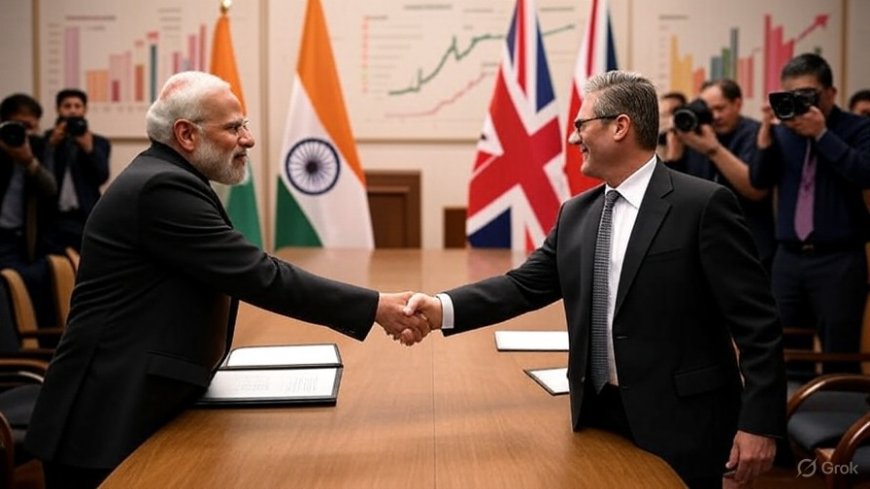India and UK Seal Historic Post-Brexit Trade Pact: A New Era in Strategic Ties Begins
On July 24, 2025, India and the UK signed a historic Free Trade Agreement lowering tariffs, easing visa rules, and boosting bilateral trade beyond $50 billion.

In a transformative moment for global trade, India and the United Kingdom have signed a landmark Free Trade Agreement (FTA) that promises to deepen economic integration, boost bilateral trade, and enhance mobility for skilled professionals. Prime Minister Narendra Modi and UK Prime Minister Keir Starmer formalized the agreement during a high-profile ceremony in New Delhi, concluding years of complex negotiations initiated in the wake of Brexit.
The deal, finalized on July 24, represents a strategic milestone in India-UK relations and marks one of the most comprehensive trade agreements India has signed with a Western power. Not only does it lower tariffs across key sectors, but it also includes progressive clauses on digital trade, sustainability, labor mobility, and innovation.
What the Agreement Includes
The agreement sharply reduces import tariffs on a wide range of goods. Key highlights include:
-
Zero tariffs on British whisky, premium automobiles, and select dairy products imported into India over the next five years.
-
Duty-free access for Indian textiles, pharmaceutical products, and engineering goods entering the UK.
-
Liberalized visa norms for Indian professionals, students, and startups under a new “Mobility and Innovation Partnership” clause.
-
Framework for digital trade, including cross-border data flow protections and harmonization of standards.
According to the Indian Ministry of Commerce, the FTA is expected to increase bilateral trade from the current $20 billion to over $50 billion within the next decade.
Strategic Implications
This agreement goes beyond economics. It signals a renewed geopolitical alignment between India and the UK. By reinforcing trust, the pact supports India’s strategic autonomy doctrine while giving the UK a strong partner in the Indo-Pacific.
Prime Minister Modi, speaking at the event, emphasized, “This deal symbolizes the shared values of democracy, open markets, and innovation. It sets the tone for a 21st-century partnership that is equitable and growth-oriented.”
His UK counterpart, Prime Minister Keir Starmer, echoed similar sentiments, stating, “This is not just a trade agreement. It’s a bridge between our people, industries, and futures.”
Impact on Key Sectors
The deal will likely have far-reaching effects on several sectors:
1. Textiles and Apparel
India’s textile exports, especially from Tamil Nadu and Gujarat, are poised to benefit significantly. British retailers are expected to increase procurement from Indian manufacturers due to reduced costs and improved supply chain logistics.
2. Pharmaceuticals
With streamlined regulatory pathways and mutual recognition of standards, Indian generic drugmakers will find easier access to UK markets, enhancing revenue and research opportunities.
3. Automobile and Spirits
British automobile giants like Jaguar Land Rover (JLR) and whisky brands such as Glenfiddich and Johnnie Walker are projected to gain market share in India. This may result in increased competition in premium segments.
4. Startups and Tech Talent
The "Mobility and Innovation Partnership" clause enables Indian entrepreneurs and tech professionals to obtain short-term visas for collaboration and business expansion in the UK. This could significantly boost India’s startup ecosystem.
Addressing Migration and Labor Concerns
One of the most debated components of the agreement was the liberalization of visa norms. Under the new framework:
-
Indian professionals in STEM fields can avail of extended work visas.
-
A pilot “youth mobility” program allows individuals aged 18-30 to work in the UK for up to two years.
-
Indian students pursuing graduate education in the UK will have post-study work options for up to three years.
This progressive stance is expected to benefit India’s aspirational middle class, while also helping the UK meet its skilled labor shortages post-Brexit.
Environmental and Ethical Commitments
In line with global trade evolution, the FTA includes environmental and ethical labor clauses:
-
A joint commitment to achieve net-zero emissions by 2070.
-
Regular review of labor rights and fair wage practices in supply chains.
-
Funding for green energy startups and clean tech research via a new India-UK Green Innovation Fund.
These clauses mark a shift toward responsible global trade, underscoring sustainability as a pillar of the partnership.
Reactions from Industry and Opposition
Industry bodies in both countries have welcomed the deal. The Confederation of Indian Industry (CII) hailed it as a “remarkable leap forward.” The UK’s Federation of Small Businesses also noted that the pact opens up new market opportunities for SMEs.
However, opposition parties in both India and the UK have raised questions. Critics argue that rapid liberalization could impact domestic manufacturers, especially small-scale enterprises. Labor unions in the UK have expressed concern about outsourcing and job security.
Commerce Minister Piyush Goyal assured that the agreement has in-built safeguards: “We have protected key sectors and included periodic review mechanisms to ensure fair play.”
Timeline and Implementation
The agreement will be tabled in the Indian Parliament and UK House of Commons for ratification. Once ratified, a phased rollout will begin in early 2026. Joint task forces have already been established to monitor implementation and address operational bottlenecks.
A digital trade facilitation platform will also be launched to help exporters navigate new rules and compliance structures efficiently.
Conclusion
The India-UK trade agreement is more than just a diplomatic win. It is a blueprint for how nations can balance economic aspirations with shared values in a complex geopolitical landscape. By focusing on equity, innovation, and people-centric policies, the deal represents the dawn of a deeper, more strategic India-UK relationship.
As the world watches closely, this FTA could set the standard for future trade partnerships between emerging economies and post-Brexit Europe.




















































